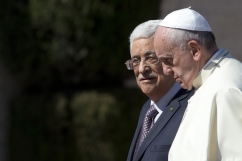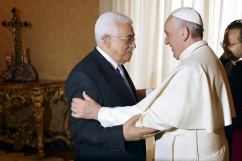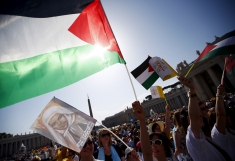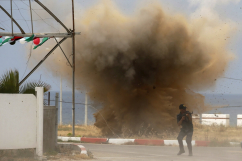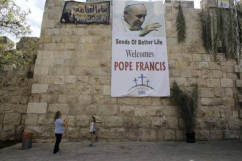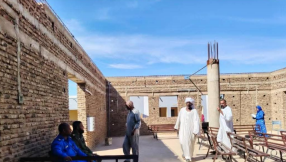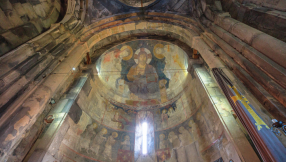The Holy See and the State of Palestine have signed an agreement recognising the freedom of religion in the latter. It was the first of its kind signed by the Vatican with a Muslim-dominated country, officials said.
The treaty may serve the two-fold goal of inspiring peace in the Middle East and setting a model for similar ones in the future with other countries in the region, the Catholic News Agency said.
The treaty, which comes after a "basic agreement" signed in February 2000, also specifies the rights and duties of the Church, its agencies, and its personnel in the Palestinian territory.
The document also supports a two-state solution to the conflict between Palestine and Israel.
The agreement is mainly about freedom of religion and conscience, the Church's freedom of action, its staff and jurisdiction, legal status, places of worship, social and charitable activity, and use of communications media.
Archbishop Paul Richard Gallagher, who made a speech after the signing, expressed hope "that the present Agreement may in some way be a stimulus to bringing a definitive end to the long-standing Israeli-Palestinian conflict, which continues to cause suffering for both parties."
He also expressed hope that "the much desired two-state solution may become a reality as soon as possible."
Gallagher said the treaty is "indicative of the progress made by the Palestinian Authority in recent years, and above all of the level of international support, which culminated in the Resolution of the General Assembly of the United Nations of 29 November 2012, which recognised Palestine as non-member Observer State at the United Nations."
Palestinian Foreign Minister Riad Al-Malki, on the other hand, said the signing ceremony would "not have been possible without the blessing of his Holiness Pope Francis for our efforts to reach it," Aljazeera quoted the official.
Al-Malki said "for the first time, the Agreement includes an official recognition by the Holy See of Palestine as a State, in recognition of the right of the Palestinian people to self-determination, freedom and dignity in an independent state of their own, free from the shackles of occupation. It also supports the vision for peace and justice in the region in accordance with international law and based on two states, living side by side in peace and security, on the basis of the 1967 borders."
He emphasised that Palestine is "the birthplace of Christianity and the cradle of monolithic religions." He described the treaty as something that "embodies our shared values of freedom, dignity, tolerance, co-existence, and equality of all."
"This comes at a time when extremism, barbaric violence, and ignorance threaten the social fabric and cultural identity of the region and indeed of human heritage. At this backdrop, the State of Palestine reiterates its commitment to combat extremism, and to promote tolerance, freedom of consciousness and religion, and to equally safeguard the rights of all its citizens," Al-Malki said.
Meanwhile, Israeli foreign ministry spokesman Emmanuel Nahshon described the agreement as a "hasty step" which damages the prospects for advancing a peace agreement, and harms the international effort to convince the Palestinian Authority to return to direct negotiations with Israel."










